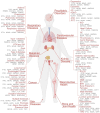Advances in Mendelian Randomization Studies of Obesity Over the Past Decade: Uncovering Key Genetic Mechanisms
- PMID: 40692977
- PMCID: PMC12278973
- DOI: 10.2147/DMSO.S528669
Advances in Mendelian Randomization Studies of Obesity Over the Past Decade: Uncovering Key Genetic Mechanisms
Abstract
Obesity is a major global public health issue linked to a wide range of chronic diseases. Understanding its complex causal pathways requires robust analytical methods. Mendelian randomization (MR), which employs genetic variants as instrumental variables, effectively addresses confounding and reverse causation and has become a key tool in obesity research. This review summarizes the development of MR methodologies, from single-sample to multivariable, mediation, and time-series models, and highlights key findings from the past decade. MR studies have revealed causal associations between obesity and nine major disease categories, including cardiovascular, metabolic, cancer, psychiatric, respiratory, renal, reproductive, musculoskeletal, and dermatological disorders. Obesity influences disease risk through mechanisms involving energy metabolism, hormonal regulation, and inflammation, with heterogeneity by age, sex, and fat distribution. Key genes such as MC4R, LEPR, FTO, and FGF21 have been identified as potential therapeutic targets. Current challenges include instrument strength, pleiotropy, population stratification, and the external validity of GWAS data. Future research that integrates multi-ancestry GWAS, functional validation, and multi-omics approaches may further enhance the utility of Mendelian randomization. MR provides a robust genetic framework for elucidating obesity's causal effects and informing targeted interventions and personalized treatment strategies.
Keywords: Mendelian randomization; genetic variation; obesity; research progress.
© 2025 Lu et al.
Conflict of interest statement
The authors report no conflicts of interest in this work.
Figures
References
-
- World Health Organization (WHO). Obesity: preventing and managing the global epidemic. Report of a WHO consultation. World Health Organ Tech Rep Ser. 2000;894:i–xii,1–253. - PubMed
Publication types
LinkOut - more resources
Full Text Sources
Miscellaneous



